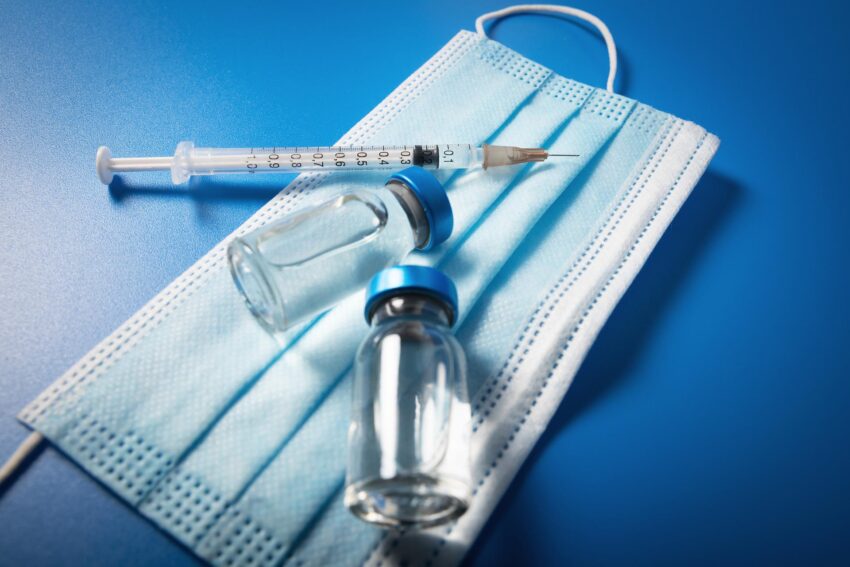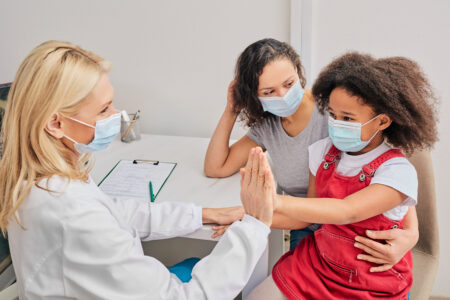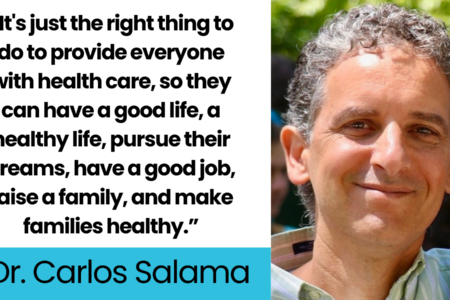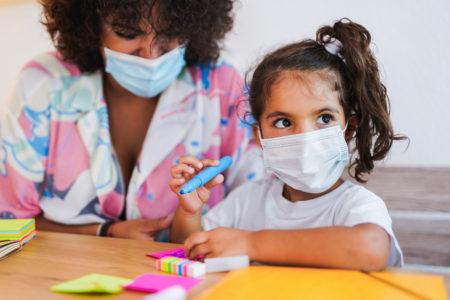
Share On Social!
Big news for Latino parents – the Moderna and the Pfizer-BioNTech COVID-19 vaccines have been authorized for children between ages 6 months and 5 years.
The CDC now recommends everyone 6 months or older to get vaccinated against COVID-19.
Those 5 years of age and older are also recommended to get a COVID-19 vaccine booster, if eligible.
“Many parents, caregivers and clinicians have been waiting for a vaccine for younger children and this action will help protect those down to 6 months of age. As we have seen with older age groups, we expect that the vaccines for younger children will provide protection from the most severe outcomes of COVID-19, such as hospitalization and death,” said FDA Commissioner Dr. Robert M. Califf in a press release.
With this recent update, it is common for parents and guardians to have questions.
What are some of the most important factors to consider?
What Are the Authorized COVID-19 Vaccines for Children?
On June 17, 2022, the FDA authorized emergency use of:
- The Moderna COVID-19 Vaccine to include use of the vaccine in individuals ages 6 months through 17 years. The vaccine had been authorized for use in adults ages 18 and older.
- The Pfizer-BioNTech COVID-19 Vaccine to include use of the vaccine in individuals ages 6 months through 4 years. The vaccine had been authorized for use in individuals ages 5 years and older.
Are the COVID-19 Vaccines Safe for Children?
The FDA determined that the known and potential benefits of the Moderna and Pfizer-BioNTech COVID-19 vaccines outweigh the known and potential risks in the pediatric populations authorized for use for each vaccine.
“As with all vaccines for any population, when authorizing COVID-19 vaccines intended for pediatric age groups, the FDA ensures that our evaluation and analysis of the data is rigorous and thorough,” said Dr. Peter Marks, director of the FDA’s Center for Biologics Evaluation and Research, in a press release. “In addition to making certain the data for these vaccines met FDA’s rigorous standards, the agency’s convening of an advisory committee was part of a transparent process to help the public have a clear understanding of the safety and effectiveness data supporting the authorization of these two vaccines for pediatric populations.”
Why Should Children Get the COVID-19 Vaccine?
All currently approved or authorized COVID-19 vaccines are safe and effective and reduce your risk of severe illness, according to the CDC.
Vaccination can reduce the spread of disease, which helps protect those who get vaccinated and the people around them.
This is important for U.S. Latinos, who have been disproportionately impacted by COVID-19 case and death rates since the pandemic began.
Of the estimated 19 million children in the U.S. younger than 5, half are children of color (compared to 40% of the U.S. population overall), including more than a quarter who are Latino (25.9%), according to a KFF report.
Also, children with underlying medical conditions are more likely to get severely ill from COVID-19. However, healthy children without underlying medical conditions can also experience severe illness.
With the COVID-19 vaccine, it will protect children against severe disease, including hospitalization.
Vaccinating children can also give parents greater confidence for children to participate in activities such as childcare and school.
Will Children Experience Side Effects?
While some children may experience side effects, others may not.
According to the CDC, reported side effects are mild, temporary and like those experienced after routine vaccines.
Side effects are more common after the second shot.
Parents can learn more about side effects following COVID-19 vaccinations here.
“COVID-19 vaccines have undergone—and will continue to undergo—the most intensive safety monitoring in U.S. history. Parents and caregivers can play an active role in monitoring the safety of these vaccines by signing their children up for v-safe – personalized and confidential health check-ins via text messages and web surveys where they can easily share with CDC how a child feels after getting a COVID-19 vaccine,” according to the CDC.
Where Can Parents Get their Children the COVID-19 Vaccine?
Distribution of pediatric vaccinations for younger children has begun.
COVID-19 vaccines are free to everyone in the United States regardless of immigration and health insurance status.
“[Vaccines] will be available at thousands of pediatric practices, pharmacies, Federally Qualified Health Centers, local health departments, clinics, and other locations,” according to the CDC.
To find locations near you that are offering vaccines for children, visit vaccines.gov or text your ZIP code to 438829, or call 1-800-232-0233.
You can also contact your state, territorial, local, or tribal health department as well as your local pharmacies or pediatrician for appointments and additional information.
How Does the COVID-19 Dosage Vary by Age?
Vaccination dosage is considered based on the age of a child and date of vaccination.
| Child’s Age | Pfizer-BioNTech | Moderna |
| 6 months- 4 years old | 3-dose primary series | 2-dose primary series |
| 5-17 years old | 2-dose primary series | 2-dose primary series |
Children receive a smaller dose of COVID-19 vaccine compared to teens and adults.
The Pfizer-BioNTech vaccine is administered as a primary series of three doses in which the initial two doses are administered three weeks apart followed by a third dose administered at least eight weeks after the second dose in individuals ages 6 months through 4 years.
The Moderna vaccine is administered as a primary series of two doses, one month apart, to children ages 6 months through 17 years.
The vaccine is also authorized to provide a third primary series dose following at least one month after the second dose for individuals 6 months to 17 years who have been determined to have certain kinds of immunocompromise.
Where Can I Find Trustworthy Information about the COVID-19 Vaccine and Children?
Information regarding COVID-19 and vaccinations is spreading constantly.
Latinos parents can get help detecting misinformation and educate themselves, their families, and communities about COVID-19 vaccination.
“To mitigate similar disparities in vaccination rates among children, it will be important to address potential access barriers, ensure vaccinations are available through trusted sites, and address parent/caregiver concerns and questions through trusted individuals in the community,” according to a KFF report.
To help move Latinos from vaccine uncertainty to vaccine confidence, Salud America! is uplifting the stories of real Latinos who overcame misinformation, got the vaccine, reconnected with family, and are helping end the pandemic.
Like Maria Maldonado.
Maldonado, who lost five family members to COVID-19 in the past year, got her 9-year-old son Jacob vaccinated when the vaccine became available.
She hopes that other Latino parents will vaccinate their children and help protect the Latino community, which has been disproportionately impacted by COVID-19.
“I feel a sense of relief. And I feel like it’s a little bit of a step forward in trying to help one another, and being a good citizen,” Maldonado said.
Find COVID-19 vaccine locations near you in English or Spanish!
By The Numbers
142
Percent
Expected rise in Latino cancer cases in coming years




[…] The pandemic is another chapter in the bitter story of American racism and inequality. Black and Latinx people are being infected and are dying at much higher rates than white Americans. Many people of […]
[…] coronavirus has killed over 61,000 Latinos in America according to the CDC, accounting for over 18.2% of the total COVID deaths in the […]
[…] Whereas Hispanics make up 11% of D.C.’s inhabitants, they signify 19% of the COVID cases, and 14% of the deaths. Equally, 46% of D.C.’s residents are Black, they usually make up an alarming 75% […]
[…] and historical mistreatment. According to the U.S. Centers for Disease Control and Prevention, Latino and Black American communities are three times more likely to become infected with […]
[…] Covid pandemic has hit the Latino community particularly hard, and data from the nonprofit health equity advocacy group Salud America! shows Latinos lead in the 0-24 age […]
[…] the pandemic, Latinos took major blows, both in terms of COVID-19 cases and also from the economic recession under former President Donald Trump. Nearly half (49%) of […]
[…] the positive trend, the harm may have already been done. The pandemic has disproportionately impacted Latino communities. Reuters reported that election-related or political disinformation that […]
[…] pesar de la tendencia positiva, es posible que el daño ya esté hecho. La pandemia ha impactado desproporcionadamente Comunidades latinas. Reuters informó que la desinformación política o relacionada con las […]
[…] residentes blancos muestran una tasa mucho más baja con 10 muertes por cada 100,000 habitantes(8 9) . Los afroestadounidenses por su parte, denuncian subsistemas de salud que les segregan […]
[…] https://salud-america.org/coronavirus-case-rates-and-death-rates-for-latinos-in-the-united-states/ […]
[…] https://salud-america.org/coronavirus-case-rates-and-death-rates-for-latinos-in-the-united-states/ […]
[…] communities have the second-highest number of COVID-19 cases in the U.S. They’re also more likely to become hospitalized and die from the disease than other […]
[…] total, around 160,000 Latinos were killed by COVID-19. This accounts for 16% of the 1 million deaths in the country. The […]